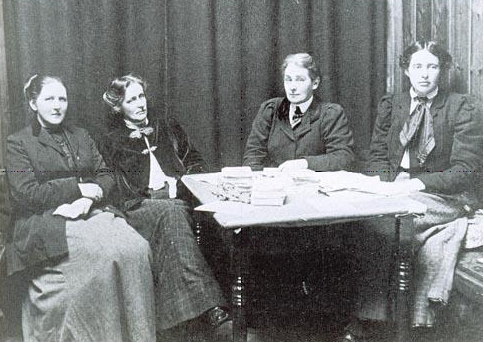
 |
||||||||||
| November 11th | Selina Cooper (Death) |
|
Callington – born Selina Cooper, née Coombe (1864 – 1946) was a suffragist (not a suffragette) and the first woman to represent the Independent Labour Party (1901) when she was the first woman to be elected to the Board of Guardians which administered the Poor Laws. Her father died of typhoid fever when she was twelve and the family moved to seek work in the textile mills of northern England, Barnoldswick (1876). She was employed as a ‘creeler’ ensuring that there was a constant supply of fresh bobbins for the cotton, earning sufficient (8 shillings a week for a 7 day a week, 8 hour shift) to rent a small house for herself and her family. After the death of her mother, Jane, Selina joined the Cotton Workers’ Union and attended classes organised by the Women's Co-operative Guild when she also began reading books about history and politics. She also read medical texts in an attempt to advise those in her neighbourhood who were unable to afford a visit to the doctor. It was through her activities that Selina Coombe met and married another activist, Robert Cooper. In 1901, the Independent Labour Party asked Selina to stand in the forthcoming Poor Law Guardian elections. She developed a national reputation for her passionate speeches in favour of womens’ suffrage and became a close friend of Millicent Fawcett who asked her to be one of the four women (pictured below with Selina on the left) to present the case for womens’ suffrage to Asquith.
|
 |
|
During the First World War, Selina organised relief in Nelson, supporting the wives and families of conscripted soldiers, and this included creating the town’s first-ever maternity home where she personally helped to deliver fifteen babies. A convinced pacifist, Selina refused to take part in army recruiting campaigns and, totally opposed to conscription, she supported the conscientious objectors. In 1917, with Margaret Bondfield (later to become the first female Cabinet Minister and also the first female Privy Councillor), she organised a Women’s Peace Crusade event which was attended by over one thousand women but ended in a riot when they were attacked. The violence was sufficient that mounted police were required to protect the lives of Selina and Margaret Bondfield. In the 1930s, she played a prominent role in the campaign against fascism and died at home on November 11th, 1946 shortly before her eighty-second birthday. |
|